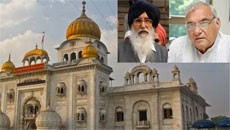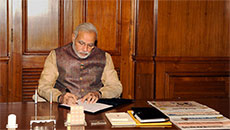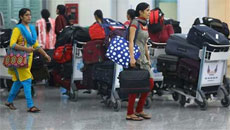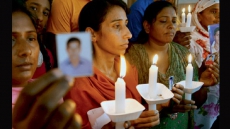Prime Minister Narendra Modi's call for replacing the Planning Commission with a suitable institution found support from "most" chief ministers Sunday, but those from Congress-ruled states and West Bengal wanted any changes should be made within the existing framework.
The meeting held at the Prime Minister's official 7, Race Course Residence, was followed by a first-of-its-kind "retreat" where the chief ministers discussed innovative practices. West Bengal Chief Minister Mamata Banerjee skipped the meeting.
In his opening remarks, Modi said states should have key role in the new body that replaces the commission and there should be an effective mechanism to address inter-state disputes.
He said relevance of the poll panel has been repeatedly questioned for more than two decades and policy planning should be "bottom to top" instead of the other way round.
"Can we develop a new mechanism, that plans according to India's strengths, empowers states, and brings on board all economic activity, including that which happens outside the government," he asked.
Modi said Team India comprised of three teams - the prime minister and chief ministers, union council of ministers, and the bureaucracy at the centre and states.
Referring to the role of think tanks in countries like the US, Modi said there was need to devise policies for "a great deal of economic activity" that takes place outside the government.
"Time has come to develop a new mechanism to deliver growth and development," he said and referred to his own experience as Gujarat chief minister.
Modi said his predecessor Manmohan Singh, in his remarks at a meeting of plan panel earlier this year, had noted that the body has "no futuristic vision in post-reform period".
Briefing reporters after the meeting, Finance Minister Arun Jaitley said that most chief ministers favoured replacing the commission with an alternative structure which has representation from the central government and the states and expert participation also.
Referring to Congress chief ministers, he said: "A few, while agreeing with the general principles of change, felt if the present Planning Commission could evolve into that structure," he said.
On the final decision of the government, Jaitley said a considered view will be taken after consultations are over but he did not specify a time frame.
The minister said there was a large consensus at the meeting that "the context has changed and there is need to decentralise both power and planning".
He said most chief ministers felt that there was a fallacy that "one size fits all" and the requirement of each state was different and the states know what suits them the best. The chief ministers felt that the strategy has to be to empower the states and strengthen federalism, he said.
Most states favoured a system which strengthens their ability to deliver and wanted more flexibility "rather than a controlled and command structure", he said.
He said Banerjee sent a letter to the prime minister suggesting that the Inter-State Council (ISC) should be given a role in the planning process.
In her letter, Banerjee urged Modi not to "dilute the autonomy of the states" but to protect and strengthen the nation's federal character, while assigning the ISC with decision making responsibilities instead of setting up a new body.
Sources said that the new body could comprise of the prime minister, some senior cabinet ministers, a few chief ministers on a rotational basis and some experts.
Congress general secretary Ajay Maken cautioned the government against diluting the plan panel's functions, and called for opposing the "short-sighted" and "dangerous" move, "made in a devious manner characterized by typical subterfuge and doublespeak". Party chief ministers, including Oommen Chandy and Virbhadra Singh, also opposed the move.
Some non-Congress, non-BJP chief ministers, however, left it to the government but stressed on greater role of states.
Modi, in his Independence Day address, had announced that a new institution would be set up "in a short span of time" to replace the commission.
The commission was conceived by India's first prime minister Jawaharlal Nehru and set up March 15, 1950.





